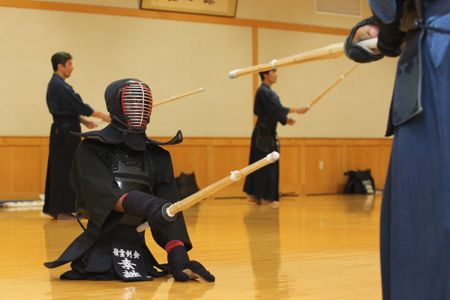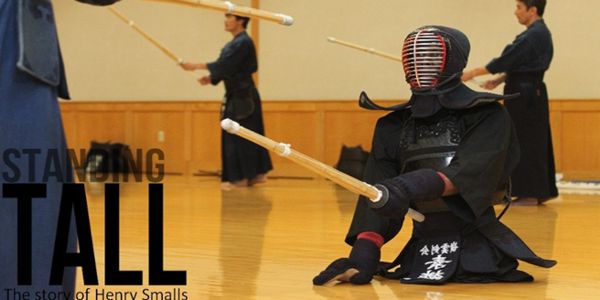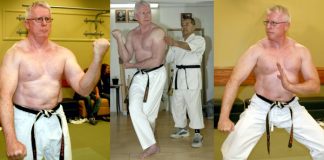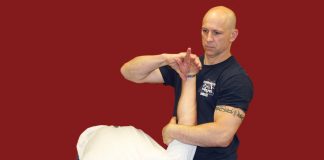Henry Smalls story is a story about a Kendo instructor in Hawaii. Like many instructors he has honed his craft through years of study and testing. Like many instructors he loves his art and passionately passes it on to the next generation of Kendo practitioners. In a match Henry is the most fiercest of competitors and outside of the dojo the most kindest of souls. Henry took the time to talk with us a little while back and we are honored and proud to share with you some of his life’s experiences and insights.
INSPIRE Martial Arts: What inspires you?
Henry Smalls: Inspiration is created on a daily basis. Inspiration in one’s daily life living history and just living an inspired life alongside life’s many circumstances. Creativity, that’s what I’m about. Born to be alive with all the infinite possibilities life represents every day in choice and faith that’s inspiration. We may not all get what we want, but we all get what we expect.
INSPIRE Martial Arts: How long have you been training in the martial arts?
Henry Smalls: I have been involved with Martial Arts one way or another since 1975. I started as a Karate Martial Arts practitioner studying Okinawan Isshin ryu and other Martial Arts like Kung fu, Aikido, etc. I now teach Kendo.
INSPIRE Martial Arts: What is your highest rank and in what style is it?
Henry Smalls: My highest rank is in my 1st style Isshin ryu, 7th dan. In Kendo I am a 5th dan and I have a 1st dan in Kyokushin Karate as well.
INSPIRE: Was it hard learning martial arts?
Henry Smalls: Some people are born with natural talent and it shines through once given the opportunity. That was the hard part at first. I was rejected by Karate schools, “you have no leg’s, I can’t teach you.” I was watching a lot of Kung fu movies at that time being the eldest brother and there were plenty of opportunities to demonstrate what I’d watched and learned after Black Belt Theater. My first Karate teacher father was a World War 2 Veteran who was also a double amputee. Sensei would always say “his father had no problem smacking him around.” Before teaching me, coincidently, he had already taught and promoted a double amputee to Black belt. I even saw him once on television demonstrating Karate out of his wheelchair. I went to my mother saying, “I told you” “I can do that!” Then later finding myself being taught by the same teacher was something.
After a karate demonstration at my junior high school Sensei came over asking if I would like to come down to the dojo to see what I could do for myself. I always remember that, to see what you can do for yourself. Many hours and time, years pass with ups and downs, teardrops, times when everyone doing the drills can’t participate in the same way, learned to create. Even to this day those early experiences in the dojo, seeing what I can do for myself, developed a strong sense of creativity in my life. It was hard learning Martial Arts. During tournaments and matches in the dojo I won respect. In Martial Arts the way is training in the dojo and out pursuing excellence processing the power of self-motivation. A burden one picked oneself is not heavy.
INSPIRE: Do you feel that martial arts have added anything special to your life?
Henry Smalls: As a kid I watched Bruce Lee in a darkened movie theater and then returned home to everyone saying I’m going to be a Martial Artist. Martial Arts provide a strong moral guidance regarding physical strength along with spiritual development. A strong work ethic and understanding the basic structure of learning can take the Martial Arts principals and apply them towards any other skill set. I have been involved in the performing arts also since I was young thanks to the Martial Arts principals guiding me as an actor, writer, musician, producer and company president.
INSPIRE Martial Arts: Who do you consider your greatest Martial Arts teacher and why?
Henry Smalls: Now for me this is a very difficult question to answer because I’ve had so many wonderful teachers along the way, so I would say all of them. I’m going to put them all into one person saying all of them believed in me and inspired me.
INSPIRE Martial Arts: Why do you practice the style you do?
Henry Smalls: Right now here in Hawaii at the Japanese Culture Center in Honolulu the Martial Arts school teaches Kendo, a Japanese form of sportsmanship as a rich elegant discipline. I started doing Kendo when I was a 4th degree Black Belt in Karate traveling and performing in tournaments. I was being showcased as a headliner performing Karate kata, weapon fighting demonstrations as well as competition. I was being seen in martial arts magazines, etc. At that time it was very unusual to have someone like myself shown in a Martial Arts magazine. I was the 1st in Black Belt Magazine! I was winning a lot of tournaments against people who were able body competitors standing up wanting to win showing no mercy. So I was very proud of being the 1st person to have broken such a barrier regarding the fact that there are no handicaps in the Martial Arts.
Be excellent and all the doors will open. I teach 3 times a week now. As a Martial Artist there was a time when it was just only practicing but I have evolved to understanding. Live your life as a Martial Art. A Martial Art mind just does or doesn’t, it just is, or isn’t. Being in the moment and having faith in daily life without thinking. No practice, no style. No need of practice. Being a swordsman fits like fish in the water. There is nothing little about all of the martial ways. No one should have his or her favorite weapon or a favorite style.
INSPIRE: What about your other Martial Arts training?
Henry Smalls: Yes, I have trained many other Martial Art styles. When I was 20 years old I was already a 4th degree black belt. I started Martial Arts around age 14 and at that time I mostly focused on Martial Arts. Most of my friends were all Martial Artists of many different styles. We fought together and exchanged ideas regarding training and fighting in different styles. The rivalries we had over the different systems was simply the best. Many years of performing Karate demonstrations and being a part of Karate demonstration teams we studied each other’s Martial Arts systems competing every week for many years.
As a Martial Artist when I was coming up it was common place to have degrees in more than one style. All of us grew up watching Bruce Lee, “use what works.” Also there’s a famous swordsman quote, “know a little bit about all disciplines.” As a Martial Artist those are some words from the wise should have great attention paid to them. I have to have working knowledge of many different martial arts style because I worked as a freelance movie and television fight scene choreographer, stunt coordinator and I have also been in movies myself performing Martial Arts.

INSPIRE: Why do you teach?
Henry Smalls: That’s a good question. I am the oldest of 5 brothers so I’ve always been in charge whether I wanted to be or not. As the oldest you develop natural traits. I think some of those traits steered me towards becoming a Martial Arts teacher. Also being a teacher I think you’re born with this nature. In the beginning I saw the Martial Arts in kung fu films being from the inner city of Philadelphia I couldn’t resist the variety of Martial Arts action fight scenes. They were a wonderful escape from my Philadelphia inner-city reality. Now I find myself teaching Martial Arts as well as founding my own independent music publishing company, THOTH MUSIC. Being a musician is like being a Martial Artist. Together they go hand-in-hand like a Renaissance man. With music I have to use; electric guitars, keyboards, bass guitars, singing, writing songs, all around music composing, producing, recording, engineering music as well as video production. With Martial Arts there is; Reiun-Kenkai Kendo Japanese swordsmanship school, teaching film fighting sequences, studies etc.
I started teaching around 16-17 years old at my 1st sensei’s dojo. Being there at the dojo all the time that’s what happens after awhile you become high-ranking then you have to stand and teach the sequence of something. You start teaching basic warm-ups then the students advance and this is how most people progress as a Martial Arts teacher. At age 25 I owned 2 dojos teaching Karate and self-defense and at the same time I was studying Kendo for the 1st time being introduced to it by my 1st Kendo teacher, a swordsman one love, may he rest in peace. After making a pact at age 16 years old to pursue wisdom, knowledge, understanding and enlightenment I eventually became a teacher. I teach because it makes a good student.
INSPIRE: Do you feel you have something different to offer a Kendo student because of your perspective?
Henry Smalls: Being very good at putting 110 percent effort when teaching self-motivation. A good teacher teaches everything when you first encounter them.
INSPIRE: Does it hurt to move around the way you do?
Henry Smalls: No it doesn’t, unless something unusual happens. Taking good care of oneself, dieting, exercising and habits like these are fully integrated in my day-to-day life now. If there was pain moving around then there would be a different paradigm that we would be discussing. The body is a temple.
INSPIRE: Do you feel like your situation has added special considerations to your Kendo performance requirements?
Henry Smalls: The answer to that question, of course, maybe not in the way you would expect. If anything most opponents expect to be better because they are all able bodied. Once they realized they were not able to best me in a sparring match many became quite upset. Most teachers also were very rough and highly demanding in regards to my performance as their student. Most opinions were if someone engaged in a fight then they fought as though their life depended on it. Kata forms always had to be modified. Each system I was a part of developed forms around my situation and judged me accordingly for rank. Coming up as a Karate tournament fighting and traveling the East Coast competing in championships and competitions I built a reputation as a champion. There were times when many fighters would be seeking me out for a match from around the world. In Martial Arts there are no handicaps. Never underestimate your opponent.
INSPIRE: How is your style of Kendo different?
Henry Smalls: Ketate no waza, one hand technique. Kendo was even harder then Karate because of just using one arm. In Karate using both arms to strike and block both hands back to the ground for movement was part of the nature. When I began Kendo fighting matches I had to resist the temptation to grasp or punch which took many years to overcome. Using a one handed Kendo style I competed in the World Kendo Tournament Championships in France and Japan. I was the first to participate in a Kendo World Tournament as a double amputee representing the state of Hawaii and the United States of America.
INSPIRE: Is there anything special you need to do to prepare?
Henry Smalls: No I’m pretty healthy and take good care of myself. I eat good, take vitamins and exercise to keep a healthy mind. I don’t dwell in negativity as it causes the body to develop disease. I drive a van I have to use and control in order for me to drive. I have been driving my own vehicle since I was 16 years old!
INSPIRE: Are there any kinds of special workouts for your arms to help you that you do?
Henry Smalls: As a young martial artist many models of training come and go although now as a teacher there’s more of a lifestyle; constantly training life, exercising, positive thinking, creativity compassion for others. Although when I was young I’d do a thousand push-ups, a thousand punches, swimming, climbing mountains, challenging stronger and stronger opponents. There comes a time when you become training the art itself when it becomes your life’s health. There is no easy way in the martial arts there is only training, training, training there is no other way.
INSPIRE: How did you lose your legs?
Henry Smalls: I lost my legs in a train accident around 11 years old. If you want any more elaboration you have to read my book.
INSPIRE: Are you angry about what happened to you?
Henry Smalls: Anger is a power that is damaging to the ones that use anger involuntarily or on purpose. Anger damages all involved. From time to time anger can be good but you have to let it go.
INSPIRE: Has your martial arts training helped you deal with your situation?
Henry Smalls: Maintaining my own company has. Having an independent music production company you have to be self-motivated, this is why music is such a passion for me. It can be so demanding and complicated but so rewarding just the same as being a Martial Artist.
INSPIRE: Do you ever get discouraged?
Henry Smalls: Life can be discouraging at times and no one is free from disappointment. Having faith and a sense of spirituality within helps. Self-motivation, empathy, compassion towards and understanding all is generated by the mind.
INSPIRE: What was your toughest moment in life and how did you get through it?
Henry Smalls: There is another saying, “all sunshine makes a desert.” No rain and there is no rainbows. There are many tough moments throughout life’s natural course but having a strong sense of pride, this in essence was made my basic reaction after having it drummed in the head by a prideful mother, is the governing factor. Having a good sense of spirituality helps as well. After the accident and during my recovery I spent a couple of years being rehabilitated in preparation to integrate back into life. Being there after the accident everything was different than before, there were ups and downs. Think, does it bother you having no legs, surprising at first people’s opinions have to be overcame expressly if one is searching one’s self. Religious study was my first love craving for truth to all things. As a kid religion was so much a part of my life that at the time many believed I was going to be a Baptist minister. Also training in zazen and thinking of being a priest at one time spiritual growth in day-to-day life is like living inside out. There are times when something happens in the moment and there is tough hardship. Time heals all wounds as time passes on and you will not even remember the hard time. Forgive, forget and move on with compassion and faith.
INSPIRE: What other things do you do outside of your martial arts training and why?

Henry Smalls: Recording, composing and practicing piano, guitar and keyboard most weeks. I am very much involved in the process of creating music, distribution and perfection of the craft of making music. As a kid instruments were toys and there were so many around growing up. Ebony magazine once wrote a story featuring me playing the drums. In 2008 something happened and there was an accident involving my mother. She was laying on her hospital bed asked me to play my music. I’m also doing THOTH MUSIC Samurai. SUMOMO GHETTO-BUSHI the warrior priest. SUMOMO is my Japanese name given to me by my 1st kendo teacher and it loosely means “preach”. GHETTO-BUSHI code of survival, this term was created to represent that even with a humble past one can achieve great titles. GHETTO-BUSHI this brand will be placed on T-shirts, hats, sportswear apparel etc. I have many movie audition opportunities coming my way right now, music opportunities as well so I am very optimistic at this time. I am also putting together a website, sort of a one-stop shop. It’s excellent each day.
INSPIRE: If you could tell everyone the most important thing you have learned from the martial arts what would that be?
Henry Smalls: There is no easy path. You have to train. Nothing worth obtaining will be achieved without effort.
Thank you Henry for your time and honesty in sharing with us and inspiring us, it has been a real pleasure. To connect with Henry Smalls please find him and his music online at: ReverbNation. We would also like give a special thank you to the incredible team at Satok Hawaii Photography.
This article was written by Jason Brinn, founder of LiveSafe










